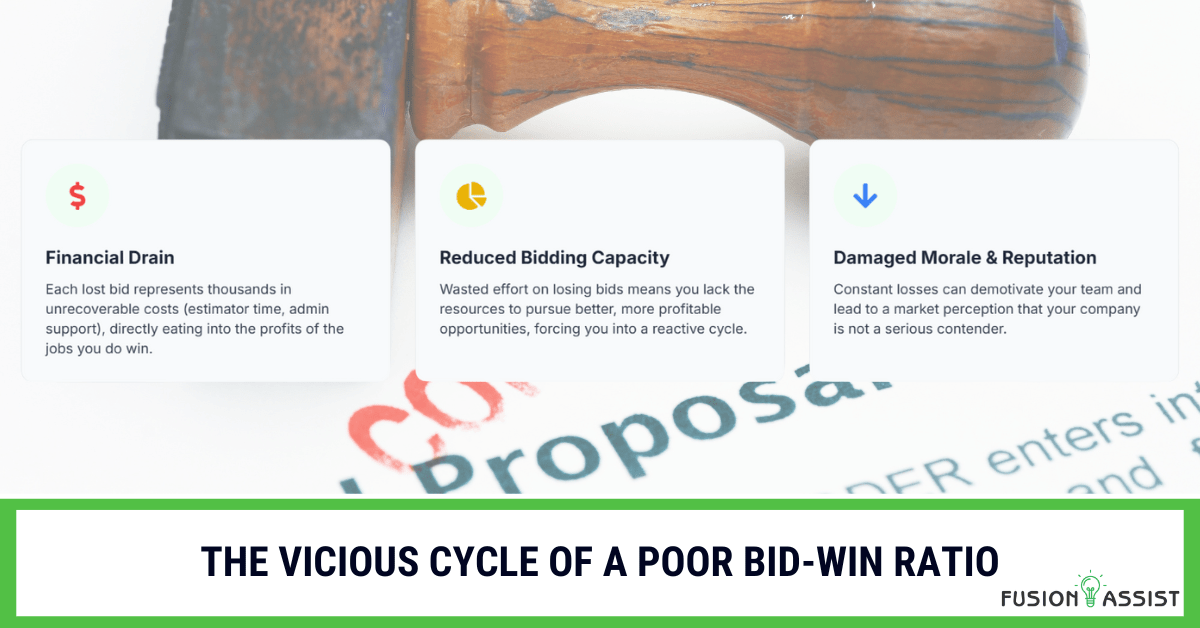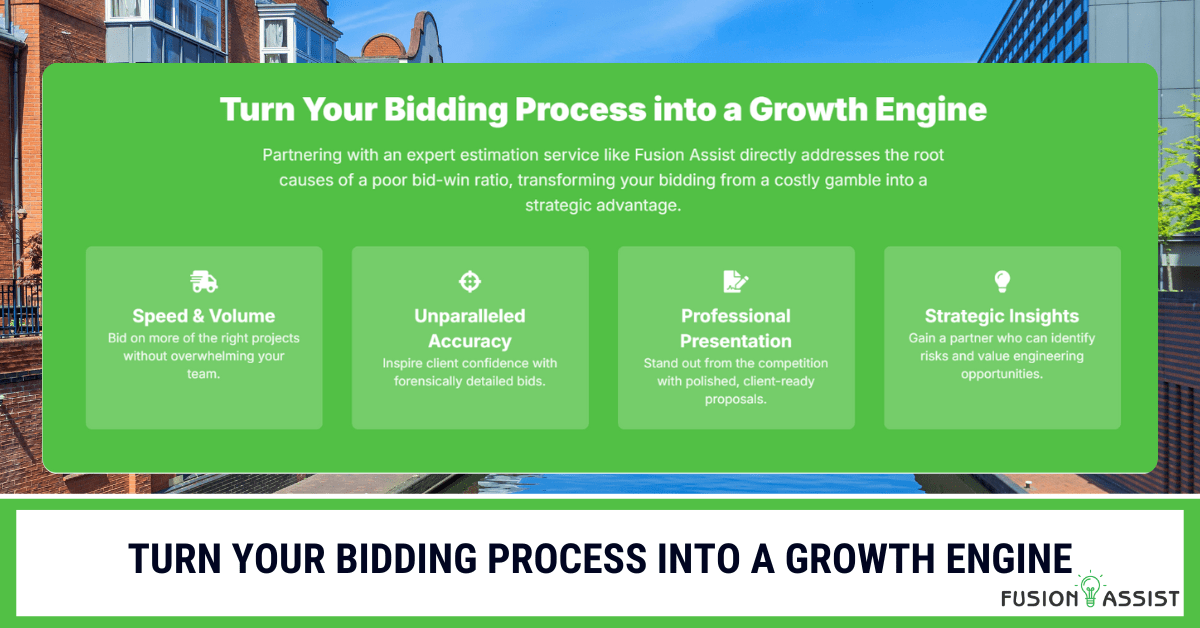Introduction: The Battle for Bids in Birmingham’s Booming Market
Birmingham is a dynamic city. Whether it is the ambitious Paradise redevelopment and the HS2 Curzon Street station or the emerging residential developments in Digbeth and the Jewellery Quarter, the landscape is full of building activity. This is a rich source of opportunity to contractors in the West Midlands. But as there is opportunity so there is fierce competition. In this crowded marketplace, every tender is a battle, and the single most important metric that defines a contractor’s commercial success is the bid-win ratio. This is a basic percentage which is calculated by dividing the number of projects won by the number of projects bid on and is a critical key performance indicator (KPI). It is a direct indicator of the efficiency, competitiveness and positioning of your company in the market.
A low bid-win ratio is more than just a series of disappointments; it’s a significant drain on your most valuable resources: time, money, and morale. The procedure of creating a detailed, correct bid is immensely resource-heavy, and may cost thousands of pounds in estimator wages and clerical time. In case of losing a bid every time, such an investment returns nothing. The answer that many contractors think is to bid lower, which in most cases can result in a race to the bottom and winning work that is unprofitable and is harmful to the business in the long term. The real key to improving your bid-win ratio isn’t about being the cheapest; it’s about being the most professional, credible, and strategic bidder.
This guide will explore the strategic importance of the bid-win ratio and how leveraging expert construction estimation services can be the single most effective strategy for maximizing it. We will take it apart and examine the anatomy of a winning bid, how exactness and professionalism affects the decisions of your clients and give a practical case study to show how by partnering with a specialist service like Fusion Assist you can turn your bidding process into a cost-effective growth engine rather than a costly gamble.
The Vicious Cycle of a Poor Bid-Win Ratio
 A consistently low bid-win ratio (typically considered to be below 1 in 5 or 20% for competitive tenders) is a symptom of deeper issues and creates a negative feedback loop that can be difficult to escape. Being familiar with them is the initial step in correction of the problem.
A consistently low bid-win ratio (typically considered to be below 1 in 5 or 20% for competitive tenders) is a symptom of deeper issues and creates a negative feedback loop that can be difficult to escape. Being familiar with them is the initial step in correction of the problem.
The Financial Drain of Wasted Resources
This is the most tangible thing. Think of what it costs to put up one, moderately complex bid:
- Estimator’s Time: Tens of hours of takeoff time, obtaining quotes and putting together the bid. At an average salary, this can easily amount to £1,500 – £3,000 per bid.
- Administrative Support: The amount of time wasting on submitting and preparing tender documents.
- Software and Data Costs: Estimation and pricing databases subscription. When you lose four out of five bids, you are effectively spending £6,000 – £12,000 in unrecoverable costs for every project you win. This directly bites off the margins of the successful project and places a huge burden on your overheads.
Reduced Bidding Capacity and Missed Opportunities
When your estimating team is always busy preparing the bids and the bids fail, the team has no space to explore other opportunities, which could be more appropriate. You might even have to reject good tenders just because you lack the resources to make up a good submission within the time. That reactive, always-on-the-back-foot strategy does not allow you to be picky and to strategically pursue the projects that best align with your company in terms of its skills and profit objectives.
Damage to Market Perception and Morale
Losing bids continually may influence the reputation of your company in the market. Clients and developers can start thinking of you as an underbidder who is not a serious competitor. In the internal front, it can be devastating in terms of morale. An estimating team that rarely sees their hard work translate into success can become demotivated, leading to a drop in quality and a “going through the motions” attitude, which only serves to worsen the bid-win ratio further.
The Anatomy of a High-Conversion Bid
The use of the lowest number does not guarantee a company to win a construction bid in a sophisticated market such as Birmingham. Senior clients are deciding on the basis of a set of criteria indicating competence, reliability and professionalism in your submission. A high-conversion bid performs well in four aspects.
Forensic Accuracy and Detail
A successful bid is one that does not give any doubts. All quantities are accurate, all materials are defined and all labour hours are counted. This detail shows that you have studied the project in detail and you know what complications it involves. It assures the customer that you are not making up the price and that you have a sound basis to charge the price you do and it makes the customer less afraid of being bombarded with change orders and price increases in the future.
Professionalism in Presentation
Your company is directly reflected in your bid document. A professional, clear, and well-formatted submission is distinguishable in comparison with an improvised spreadsheet. It must be easy to read through with a clear scope of works, a breakdown of costs and a clear list of what is included and not. This professionalism is an indication that you are a well organised company with details and easy to do business with.
Transparent Risk Management
A sophisticated bid does not deny that risks do not occur; it reveals them and describes how they will be controlled. This can also involve drawing to your clients’ attention potential ground condition issues or an investigation plan, or showing in advance of the construction programme that you have been talking to suppliers for specialist materials which are long lead times. Also, including a well-backed up contingency sum is a sign of a sensible contractor. This openness creates huge trust.
Demonstrable Value, Not Just Price
The winning bid is able to convey value. This can be done by making a value engineering proposal, which is an idea to use a cheaper material or a cheaper way of constructing without compromising any quality. It can also be proven by pointing out the fact that your team has a certain experience with the similar projects or that your supply chain is strong. It is aimed at ensuring that the client does not focus on who is the cheapest. to who will give the best “all around value and the least risk”?
How Expert Estimation Services Directly Impact Your Bid-Win Ratio
This is where a strategic collaboration with a professional estimation service turns out to be a game-changer. By outsourcing this critical function, you address the root causes of a poor bid-win ratio and fundamentally enhance the quality and effectiveness of your submissions.
Speed and Volume: Bidding on More of the Right Projects
In this way, you can expand your bidding power immediately by using an outside group of estimators. An estimate such as that provided by Fusion Assist can be reversed within 48-72 hours, a small portion of the time an over-strained in house team may take. With this new efficiency you can:
- Be More Selective: You will be able to review more tenders and be more selective on the ones that you will bid on that are a perfect match of your expertise and have the highest profit potential.
- Never Miss a Deadline: You will be able to take up last minute opportunities without affecting the quality of your submission. This change of attitude in terms of reactive to proactive bidding strategy is the key to increasing your win rate.
Unparalleled Accuracy: Reducing Risk and Inspiring Client Confidence
Specialist estimation services are data breathers. They integrate the strength of digital takeoff software with regularly refreshed material and labour costs databases. This provides an accuracy that is hard to be achieved by a general contractor internally. This precision directly boosts your bid-win ratio by:
- Building Trust: Having a forensically detailed bid will make clients have enormous trust in your numbers. They tend to go with a bid they feel comfortable with even though it is not the lowest.
- Reducing Your Own Risk: You are able to bid more competitively and tighter with the correct costs without jeopardizing your profit margin. You do away with the necessity of putting on excessive padding to offset uncertainty which puts you out of the game many times.
Professional Presentation: Standing Out from the Competition
Bid documentation is also the specialty of the expert estimation services. They provide professionally prepared reports that are easy to read and are presented in a format that is likely to impress the quantity surveyor or the project manager of a client. What you get in a package delivered by a service such as Fusion Assist is simply a bid-in-a-box with takeoffs, cost overviews, and clearly defined scopes. When you present this quality of professional documentation, you already place yourself above your competitors who will present a one-page price quote.
Strategic Insights: Moving Beyond Raw Numbers
The most effective estimation services are strategic partners not number crunchers. Their estimators are experienced in numerous projects, and they can provide useful information. They are able to highlight the possible design risks, opportunities where value engineering can be done and also give benchmark information to aid you in determining whether your prices are competitive. Such a strategic contribution will enable you to make a smarter bid that will show your proactive attitude toward problem-solving.
Real-World Application: The Fusion Assist Advantage in Practice
The Client and the Challenge
A mid-sized Birmingham contractor was struggling with their bid-win ratio, which had fallen to around 1 in 8 (12.5%). Their estimator in-house was overwhelmed and their quotations hurried and not detailed enough to compete with the bigger companies. They were invited to tender for a £5 million mixed-use development in Digbeth, involving the refurbishment of a historic industrial building and the construction of a new-build apartment block behind it. They were aware that they would not be able to win with their usual strategy.
The Fusion Assist Solution in Action
Fusion Assist was hired by the contractor to take care of the whole estimate.
- Rapid and Dual-Focus Takeoff: Fusion Assist assigned two estimators to the project: one specializing in heritage refurbishment and the other in new-build residential. They performed a rapid but detailed digital takeoff of both elements, accurately capturing the complexities of each.
- Risk Identification: The report of the service indicated the major risks, such as the possible expense of the specialist brick-cleaning of the historic facade and the extended lead time of the mentioned German-made window systems. They gave them budgetary allocations on these items.
- Value Engineering Proposal: Fusion Assist identified that an alternative, UK-based cladding system for the new build could offer a £75,000 saving with no compromise on aesthetic or performance and a shorter lead time.
- Professional Bid Package: The contractor was supplied with a complete bid package in a period of three days. It comprised individual, detailed costings of the refurbishment and new-build components, a clear risk register and the value engineering proposal as a formal addendum.
The Result: A Strategic Win
The Fusion Assist package was filed by the contractor. The proactive risk management and the depth of detail were the factors that impressed the client greatly during the tender review. Although two other bids were a little lower on the headline price, neither had shown the most relevant risks nor provided a sensible value engineering alternative. The bid by the contractor was selected by the client because it made them most confident of the successful outcome of the project. The contractor not only won a profitable project but also established a new, more effective bidding process, subsequently improving their overall bid-win ratio to 1 in 4 over the next year.
Conclusion: Bid Smarter, Not Just Harder
In Birmingham’s competitive construction market, your bid-win ratio is the ultimate measure of your commercial effectiveness. A bad ratio is a waste of resources that suppresses development and spirits. The answer is not to increase the number of bids you prepare, but to prepare bids with an improved quality, accuracy, and professionalism as a fundamental requirement. There is no more direct and effective way than using the speed, accuracy and tactical insight of a professional construction estimation service to realise this. Through the assistance of a specialist such as Fusion Assist, you turn your bidding into a strategic tool, turning it into a resource-saving activity enabling you to win more of the right projects and develop a more profitable, sustainable business.
Stop letting a low bid-win ratio drain your resources and morale. It’s time to transform your bidding process from a costly gamble into a strategic growth engine. Partner with Fusion Assist for the speed, accuracy, and professionalism that wins profitable contracts in Birmingham’s competitive market. Contact us today to build your next winning bid.
Frequently Asked Questions (FAQs)
What is considered a “good” bid-win ratio in construction?
This is sector specific but in the case of competitively tendered projects, 1:3 to 1:5 (33% to 20%) is deemed as healthy. This must be much higher in case of negotiated work or projects where there is an existing relationship. When the ratio of competitive bids is always less than 1 in 6 there is a good indication that your bidding process has to be looked at strategically.
Wouldn t an estimation service be another expense to my bids?
Although the service has a fee attached to it, one should not consider it as a cost but as an investment. The fee for a professional estimate (e.g., £1,000 – £2,500) is often less than the cost of your own in-house estimator’s time. What is more important is that with the help of the service you will win one more project you would have lost, so the service will pay itself many times over and leave your internal resources free.
Could an outsourced service have a clue on the overheads and profit targets of my business?
Yes. Another important element of the onboarding procedure with such a service as Fusion Assist is their familiarity with your business structure. You give them your percentages that you require in overheads and profit and they apply these percentages to the base costs which they calculate. The last offer is your personal financial model.
Will the outsourcing of the bidding process make me lose control of the process?
No, you become in control. The outsourcing of the time-consuming activities of takeoffs and pricing allows you to concentrate on the high-level strategy. Instead of being lost in spreadsheets, you can use your time to review the final numbers, perfect the value engineering proposals and develop relationships with the client.
Should it be a new in-house estimator or a third party service?
The cost of employing a new full-time estimator would be high in the long-term (salary, NI, pension, equipment, training) and it will not resolve the issue of variable workloads. A third party service offers a scalable flexible solution. You only pay when you use the service and you can increase or reduce your bidding capacity in seconds to meet the rate of tender opportunities.


